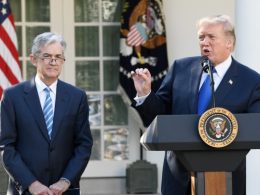President-elect Donald Trump’s appointment of a slate of new antitrust regulators is predicted to herald a more favourable climate for healthcare mergers and acquisitions.
That, at least, is the expectation, as well as hope, of lawyers who have worked on healthcare deals that have become ensnared in litigation and regulatory challenges under the outgoing administration.
During the presidency of Joe Biden, the healthcare industry has been one of the main targets for regulators. Their actions have ranged from attempting to tackle private equity “roll-up” schemes accused of creating monopoly pricing power for hospital and clinic networks, to scrutinising the influence of pharmacy intermediaries in drug pricing investigations.
Lina Khan, who Biden appointed as chair of the US Federal Trade Commission in 2021, and Jonathan Kanter, who was named assistant attorney-general for the Department of Justice’s antitrust division in the same year, have worked alongside each other in taking a tougher antitrust approach to business.
Together, they have beefed up rules for monitoring deals and have blocked more acquisitions than previous administrations. Healthcare was one of the most closely scrutinised industries by the authorities over the past four years — second only to Big Tech for crackdowns on potentially monopolistic practices.
Dealmakers and their legal advisers now hope that, under Trump’s second administration, the risk of antitrust regulators delaying or thwarting a deal will be smaller. Frank Aquila, a partner at law firm Sullivan & Cromwell, says he expects the new leadership at the FTC and DoJ to take a more “pro-business” stance and, with it, a “significantly different” and less interventionist approach to enforcement.
“Many transactions that would have been held up, won’t be,” says Aquila. “I would anticipate delays will only happen where the overlap [between two businesses] creates a real risk of anti-competitive behaviour.”
Previously, the FTC’s Khan had admitted to placing “a very high prioritisation on healthcare, in particular . . . because we have seen consolidation there but also because healthcare is just so essential to people’s lives”.
In 2022 alone, the FTC challenged at least six healthcare deals out of a total of 50 where the agency took merger enforcement action. “Many deals were deterred from ever happening under Lina Khan,” observes Barak Orbach, professor of law and business at the University of Arizona.
Others were held up. Sullivan & Cromwell advised US biotech group Amgen on its purchase of Ireland-based rare-disease drugmaker Horizon Therapeutics for $28bn, including debt. But the deal, which had been first announced in 2022, was delayed by the FTC, which sued to block it despite Amgen owning no competitor medicines to Horizon’s.
The agency argued that the US pharma group would use its existing blockbuster drugs to strike deals with insurers that gave priority to Horizon’s lead drugs on their “formularies” of approved medications. In the end, however, the deal closed with limited concessions.
In the first antitrust lawsuit brought by the FTC under Khan’s direction, Jane Willis, a partner specialising in antitrust litigation at law firm Ropes & Gray, successfully defended private equity firm Welsh Carson over its dealings and minority stake in anaesthesiology clinic network US Anesthesia Partners.

The action had accused both the firm and the network of a “multiyear anti-competitive scheme” in Texas and “systematically buying up nearly every large anaesthesia practice in [the state] to create a single dominant provider with the power to demand higher prices”. But, in May, a Texas judge told the FTC to drop its case against Welsh Carson on the basis that it did not prove how, as a minority investor, it was actively violating competition law. The case against US Anesthesia Partners continues.
With action against Welsh Carson dropped, Willis says the hope is Trump’s antitrust regulators will be more “predictable and merit-based”.
David Hennes, an M&A partner at Ropes & Gray, argues that “the [FTC] obsession with private equity has been unhealthy and frequently divorced from the merits of the transaction.” He adds: “The FTC needs to get away from an industry-specific bogeyman-type analysis.”
However, a less interventionist approach is not guaranteed. Last week, President-elect Trump nominated Gail Slater to head the Department of Justice’s antitrust division. She had been a top aide to his vice-presidential running mate JD Vance, and is expected to pursue a crackdown on Big Tech, among others.
This suggests the new administration may yet maintain a hawkish stance on competition policy. At the same time, though, one of the current Republican FTC commissioners, Melissa Holyoak, is also a top contender to become chair and is deemed to take a more traditionally conservative approach to antitrust.
“Perhaps, in some ways, Lina Khan was ideological — I could imagine that somebody else could be ideological about something else,” says Willis.
Michael Carrier, a professor specialising in antitrust law covering pharmaceutical and high-tech industries at Rutgers University, says the current administration had “pushed the bounds” of antitrust enforcement in targeting Amgen over its Horizon acquisition, “which was neither horizontal nor vertical integration”.
He adds that the FTC stopped drugmaker Sanofi’s licensing buyout deal with biotech group Maze, despite the targeted lead drug still being in phase-one trials.
But he suggests Trump’s new antitrust enforcers may also pursue litigation in the healthcare sector “to play to the crowd, as high drug prices are a bipartisan issue”.
Case studies: read about the most innovative services that lawyers have developed for clients, plus the top law firm practitioners here.
Source link









